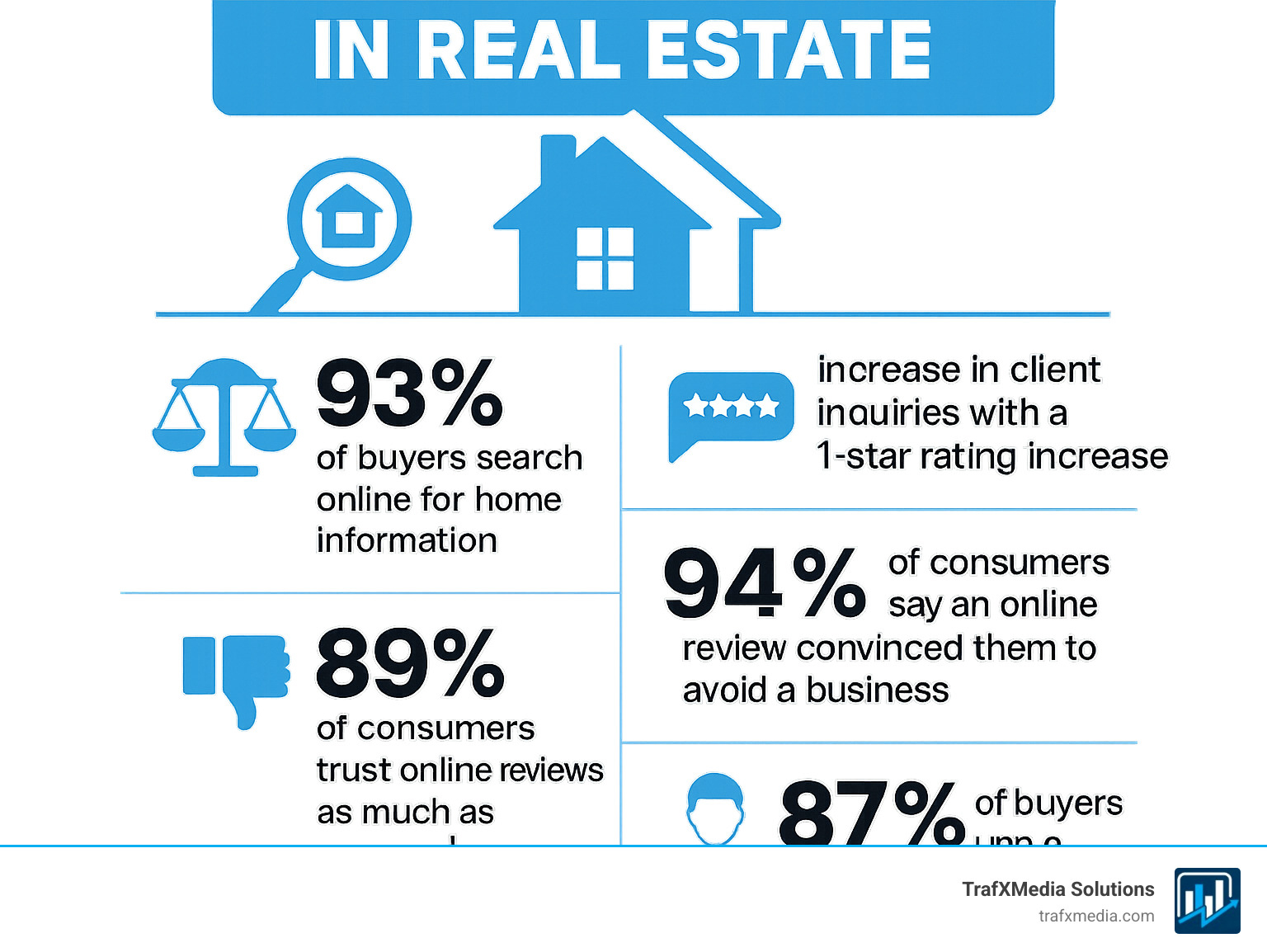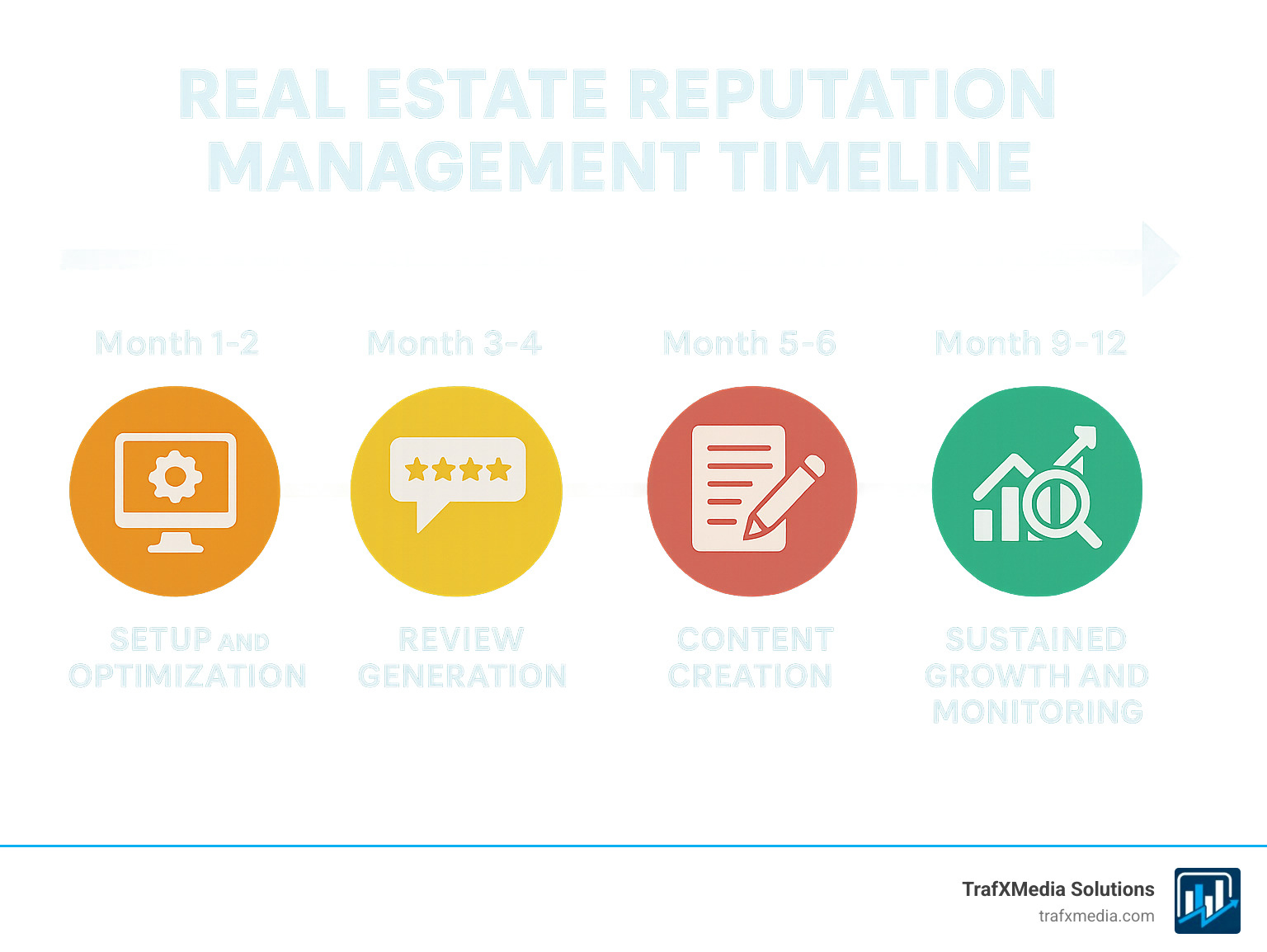Protect Your Property (and Your Image) with Real Estate Reputation Management
Why Your Digital First Impression is Everything
Real estate reputation management is the strategic process of monitoring, influencing, and improving how your real estate business appears online to build trust, attract clients, and drive revenue.
Key Benefits of Real Estate Reputation Management:
- Monitor online presence – Track reviews, social media mentions, and search results
- Generate positive reviews – Systematically collect feedback from satisfied clients
- Respond professionally – Address both positive and negative feedback promptly
- Boost local SEO – Improve search rankings through review signals
- Build client trust – Establish credibility with potential buyers and sellers
Your online reputation often determines if a client chooses you or a competitor. Consider this: 93% of consumers go online for their primary source of information when looking for a new home, and 89% trust online reviews as much as personal recommendations.
A single negative review in Google search results can cost you thousands in lost commissions. Meanwhile, businesses with strong online reputations see measurable growth – a one-star increase in overall rating leads to a 5% to 9% increase in revenue.
Your digital presence isn’t just marketing; it’s your business lifeline. When someone searches for San Francisco real estate services, what they find in seconds shapes their perception of your expertise and trustworthiness.
I’m Richard Taylor, and I’ve helped globally recognized brands like Intel and Louis Vuitton steer complex digital landscapes. My experience in real estate reputation management combines technical SEO with strategic consulting to help property professionals protect and grow their online presence. In this guide, I’ll show you the essential tools and strategies to transform your digital reputation from a liability into your greatest asset.

The High Stakes of Online Perception in the Real Estate Market
Real estate runs on trust, which is now built or broken online before you ever meet a client. When researching agents for an $800,000 San Francisco home, clients aren’t just looking for competence—they’re entrusting you with their life savings.
The stakes couldn’t be higher. 82% of consumers read online reviews before making a purchase, and in real estate, that purchase is often the biggest financial decision of their lifetime. A single negative review at the top of Google search results can cost you thousands in lost commissions.
This is even more challenging because 97% of Millennials read local business reviews online, and 91% of people aged 18-34 trust online reviews as much as personal recommendations. Since 75% of buyers between ages 25-33 are purchasing their first homes, your online reputation directly impacts your ability to capture the largest segment of active home buyers.
These digital natives expect reviews. They research agents across platforms, compare ratings, and read feedback before making contact. In San Francisco’s competitive market, your online reputation is often the deciding factor.
The competitive landscape has shifted. 26% of buyers find their agent online, meaning your digital presence is a primary source of new business, not just a supplement to referrals. A Harvard Business School study found that businesses with stronger online reputations see measurable growth across all metrics.
Real estate reputation management is essential for real estate agents building personal brands, property management companies handling tenant relationships, brokerages managing corporate reputation, real estate developers in property sales, and mortgage lenders supporting transactions.
Unique Reputation Challenges Across Real Estate Sectors
While the principles of reputation management are universal, their application varies significantly across different segments of the real estate industry.
- For Individual Real Estate Agents: Your reputation is your personal brand. Every review, comment, and social media post is tied directly to your name. The primary challenge is building individual trust and authority while carefully managing the line between your personal and professional online presence. A negative review isn’t just a critique of a business; it feels like a personal attack and can directly impact your livelihood.
- For Real Estate Brokerages: A brokerage’s reputation is the sum of its parts—meaning it’s an aggregate of every agent’s performance. The key challenge is maintaining brand consistency and quality control. A single agent’s misstep or poor review can tarnish the entire brokerage’s image, affecting its ability to recruit and retain top-performing agents and attract high-value clients.
- For Property Management Companies: The reputation dynamic here is fundamentally different. Instead of a one-time transaction, property managers have ongoing, long-term relationships with tenants. This creates a high volume of potential feedback, often centered on sensitive issues like maintenance requests, rent increases, and security deposits. The challenge is managing a constant stream of reviews from tenants while simultaneously marketing a positive, reliable image to attract new property owners as clients.
- For Real Estate Developers: A developer’s reputation is built over years and across multiple large-scale projects. They must manage perceptions among diverse stakeholders: community groups concerned about local impact, municipal planning departments, investors, and, ultimately, the end buyers. A single controversial or poorly executed project can damage their brand for years, impacting their ability to secure financing and approvals for future developments.
What is Real Estate Reputation Management?
Think of real estate reputation management as your digital bodyguard and publicist combined. It’s the strategic process of monitoring, influencing, and improving how your business appears across all digital touchpoints.
Monitoring your online presence means tracking what people say about you on Google My Business, Zillow, Realtor.com, Yelp, Facebook, and industry-specific sites. This goes beyond direct reviews to tracking social media mentions, forum discussions, and any content mentioning your name or business.
Influencing public perception happens through strategic content, SEO, and proactive engagement. You create positive content that ranks well, optimize your profiles, and ensure your best testimonials are easily findable.
Strategic response protocols for feedback require skill and consistency. Knowing how to respond professionally to criticism while amplifying praise can prevent a reputation crisis.
Proactive content creation establishes your expertise and builds trust. This might include local market insights, home buying guides, or showcasing community involvement.
Protecting your brand image through ongoing monitoring and quick response to threats keeps small issues from becoming big problems. In the digital world, issues escalate quickly, so having systems to address problems early is crucial.
The Undeniable Link Between Reputation and Revenue
Core Strategies for Building a 5-Star Real Estate Reputation

Winning online requires a plan. These strategies convert happy clients into advocates and ensure a single bad comment doesn’t define your brand.
Mastering Online Review Management
Happy clients often forget to leave a review, so you need an easy, repeatable system to prompt them.
- Send a short, personalized text or email within 24 hours of closing that links directly to your preferred review site.
- Follow up once (politely) if they forget—it’s often all the reminder they need.
When saying thank you for a positive review, reference something specific so the response feels genuine: “Sarah, guiding you through Nob Hill’s competitive market was a pleasure—enjoy that new roof deck view!”
For negative feedback, respond fast, stay calm, and move the discussion offline: “Mike, I’m sorry the selling timeline felt rushed. Please call me directly so we can discuss this further.” Readers judge your professionalism by your reply more than the complaint itself.
Key platforms to monitor first are Google Business Profile, Zillow, Realtor.com, Yelp, and Facebook. A single dashboard for all comments saves hours each month.
Finally, recycle the praise you receive. Showcase standout testimonials on your website, listing presentations, and social channels to extend their reach.
The Role of SEO and Social Media
Since most web traffic starts with a search engine, you must control what appears when someone Googles your name. Publish market guides, neighborhood spotlights, and blog posts that solve common buyer or seller questions. These pieces rank for local queries and push negative content down the page.
Local SEO tips that move the needle quickly:
- Completely fill out your Google Business Profile and upload fresh listing photos monthly.
- Add “San Francisco real estate agent” (or your niche) to title tags and meta descriptions.
- Earn backlinks by writing guest columns for reputable local publications.
On social media, “show, don’t tell.” Post short Reels of new listings, celebrate client key-handoffs, and join neighborhood Facebook discussions. This activity provides Google with social signals that reinforce your authority.
Key Components of an Effective Real Estate Reputation Management Strategy
- Consistency – use the same tone, headshot, and messaging everywhere.
- Timeliness – aim to reply to every review and comment within 24 hours.
- Professionalism – never argue in public; move heated conversations to a private channel.
- Authenticity – let your personality show, but focus on solving client problems.
- Transparency – if you make a mistake, own it and explain how you’ll fix it.
- Dedicated review page – embed your best testimonials on a single page of your website.
Essential Tools and Services for Real Estate Reputation Management

Managing your reputation across multiple platforms can be overwhelming while juggling client meetings and deals. The right tools can transform this challenge into an automated system that works for you 24/7.
Think of reputation management tools as a digital assistant that never sleeps, misses a review, or forgets to follow up. These platforms have evolved beyond simple monitoring to become comprehensive solutions that protect and improve your professional image.
Automation takes the guesswork out of collecting reviews. Instead of manually asking each client for feedback, these tools automatically send personalized review requests at the perfect moment—right after a successful closing.
Monitoring capabilities act like a radar system, scanning the internet for any mention of your name or business. Whether someone leaves a review on Zillow or mentions you in a Facebook group, you’ll know immediately.
Analytics transform raw data into actionable insights. You’ll see which platforms drive the most leads, understand client sentiment, and identify trends to improve your service.
Efficiency features streamline your workflow through centralized dashboards where you can respond to reviews, monitor social media, and track your reputation from one location. This means less time switching between platforms and more time helping clients.
| Feature | Benefit for Real Estate Professionals |
|---|---|
| Review Management | Monitor and respond to feedback across Google, Zillow, and other key platforms from one dashboard |
| Social Listening | Track conversations about your business across social media and online forums |
| SEO Analytics | Understand how your reputation impacts your search rankings and visibility |
Choosing the Right Support for Your Business
The reputation management landscape offers everything from basic monitoring tools to comprehensive platforms for real estate professionals. The key is finding a solution that fits your workflow, not one that complicates it.
Review management features should be intuitive. Look for platforms that understand the real estate transaction timeline and can customize outreach accordingly.
Social media monitoring needs to go beyond basic keyword tracking. Your ideal platform should understand the context of real estate conversations and distinguish between casual mentions and serious concerns.
SEO analytics are valuable when they connect your online reputation to business results. Tools that show how positive reviews boost local search rankings help you understand the ROI of your efforts.
Transaction management integrations eliminate friction between your existing systems and reputation management. When your CRM automatically triggers review requests, you maintain consistent follow-up without manual work.
All-in-one solutions for real estate often provide the best value because they understand your industry’s unique challenges, like longer transaction cycles and higher emotional stakes.
Overcoming Common Real estate Reputation Management Problems
Even with the best tools, real estate professionals face unique challenges that require strategic solutions.
Time constraints are a major hurdle. The solution isn’t finding more time; it’s creating automated systems. Set up review request sequences triggered by transaction milestones and use templates to save time while maintaining a personal touch.
Negative feedback stings, but it’s an opportunity to demonstrate professionalism. A thoughtful, solution-focused response often impresses potential clients more than a dozen positive reviews.
Ensuring team consistency is crucial for brokerages. Establish clear guidelines and provide approved response templates to maintain your brand voice across all agents.
Reacting in real-time to threats requires systems that alert you immediately. The difference between addressing a negative review within hours versus days can determine whether it becomes a minor issue or a major crisis.
Balancing personal and brand reputation is a challenge for agents. Clear social media guidelines and separate professional accounts help maintain this balance and ensure consistent messaging.
Frequently Asked Questions about Real Estate Reputation
How do you build a strong real estate reputation from scratch?
Building a reputation from scratch is achievable with the right approach. Think of it like building a house: you need a solid foundation first.
Start by providing exceptional service to every client. Your reputation is only as strong as your weakest client interaction, and in real estate, word travels fast.
The secret weapon is proactively asking every satisfied client for a review. 85% of consumers read up to 10 online reviews before making decisions, but most happy clients won’t leave one unless you ask.
Claim and optimize all your online profiles across Google My Business, Zillow, Realtor.com, and other relevant platforms. Complete every section thoughtfully with high-quality photos and current information. These profiles are your digital business cards.
Create valuable local content that demonstrates your market expertise. Answer common client questions to build authority and help potential clients find you.
Engage positively on social media by sharing market updates, celebrating client successes (with permission), and participating in community discussions. 7 out of 10 consumers are more likely to use a local business if it has a social media presence.
Can a single negative review really hurt my business?
Yes, a single negative review can significantly impact your business, especially in search results. 94% of consumers report that a bad review has convinced them to avoid a business, and real estate buyers are particularly cautious.
However, how you respond matters more than the review itself. A professional, empathetic response that addresses the client’s concerns can strengthen your reputation. Potential clients want to see how you handle challenges.
Context is everything. One negative review among twenty positive ones is less damaging than one negative review out of three total. This is why consistently generating positive reviews is so important.
Interestingly, 82% of customers actively look for negative reviews. They expect some criticism and are evaluating the overall pattern and your professionalism in addressing concerns.
A thoughtful response to criticism often impresses potential clients more than a string of generic positive reviews, showing you care about client satisfaction.
Is reputation management a one-time fix or an ongoing process?
Real estate reputation management is an ongoing process, not a one-time project. It’s like physical fitness—you can’t work out for a month and expect to stay in shape all year.
The digital landscape constantly evolves. New platforms emerge, algorithms change, and your online presence is continuously evaluated by potential clients. Google processes 8.5 billion searches every day.
Your reputation grows through consistent actions. New reviews and mentions require ongoing monitoring and response. Market conditions and client expectations shift, requiring adjustments to your strategy.
Building a strong reputation typically takes 6-12 months to see significant improvements in search rankings and review profiles. Maintaining it requires ongoing effort to generate positive content, respond to feedback, and adapt to digital trends.
Once you establish effective systems, real estate reputation management becomes more manageable, like a habit.

The timeline above shows how reputation management efforts unfold. Early months focus on setup and foundation-building, while later months emphasize sustained growth and monitoring. This reflects that reputation building is a marathon, not a sprint.
Conclusion: Secure Your Legacy and Grow Your Business
Your online reputation is more than reviews; it’s the digital foundation determining if your real estate business thrives or struggles. The numbers don’t lie: 93% of consumers go online for home searches, 89% trust online reviews as much as personal recommendations, and reputation is a critical factor when buyers choose an agent.
Real estate reputation management isn’t just another marketing expense; it’s one of the smartest investments in your business’s future. A single star increase in your rating can translate to a 5-9% boost in revenue. For most agents, that means tens of thousands in additional commissions annually. Conversely, one poorly handled negative review can cost you multiple deals.
Building trust through a strategic online presence creates a powerful, growing competitive advantage. Each positive review, professional response, and piece of valuable content builds on itself, like compound interest for your reputation, working 24/7 to attract quality leads.
The real estate industry is changing, and client loyalty increasingly depends on your digital presence. Today’s clients want an agent they can trust with their biggest financial decision. Your online reputation serves as proof of that trustworthiness before you ever meet.
Long-term growth in real estate now runs through digital channels. As more transactions start online, your digital presence becomes the gateway to new business. Professionals who invest in comprehensive reputation management will capture the best clients. Those who ignore it will be left behind.
Here in San Francisco, we see this change daily. At TrafXMedia Solutions, we help local businesses build an online presence that turns digital visitors into loyal customers. We understand the unique challenges of San Francisco’s business community and have seen how strategic reputation management can transform a business.
Your reputation is your professional legacy—the sum of every client interaction and successful transaction. That legacy lives online, influencing potential clients around the clock. The effort you invest in protecting your online reputation today will pay dividends throughout your career.
The competitive edge you gain from excellent reputation management compounds over time. While others scramble to handle negative reviews, you’ll have a system that consistently attracts quality leads and turns them into satisfied clients and advocates.
Ready to take control of your digital destiny? Your reputation is too important to leave to chance. Learn more about our SEO services for San Francisco businesses and find how we can help you build the online presence your business deserves.







